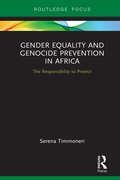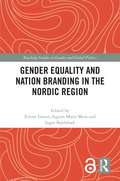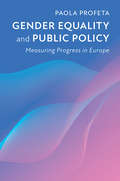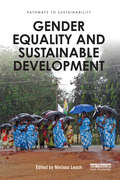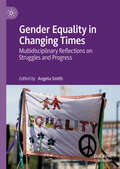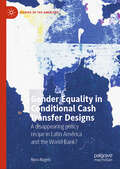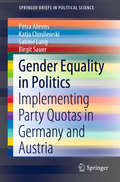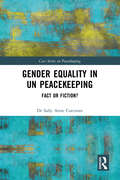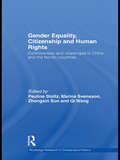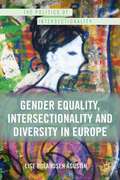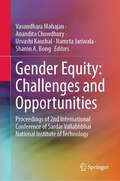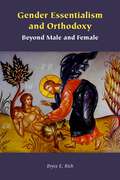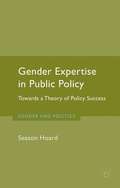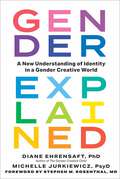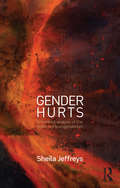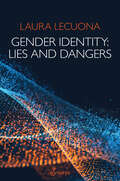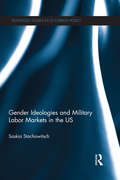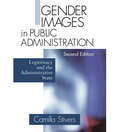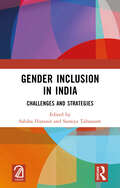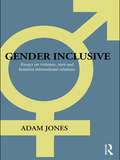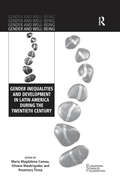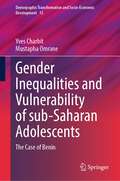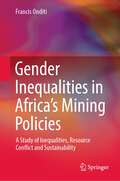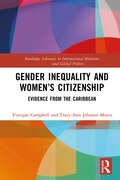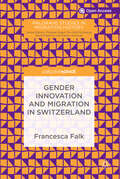- Table View
- List View
Gender Equality and Genocide Prevention in Africa: The Responsibility to Protect
by Serena TimmoneriThis book investigates what impact gender equality has on genocide in Africa, to verify whether it is a missing indicator from current risk assessments and models for genocide prevention. Examining whether States characterised by lower levels of gender equality are more likely to experience genocide, Timmoneri adds gender indicators to the existing early warning assessment for the prevention of genocide. Moreover, the book argues for the formulation of policies directed at the improvement of gender equality not just as a means to improve women's conditions but as a tool to reduce the risk of genocide and mass atrocities. Using case studies from Nigeria, Ethiopia, Angola, Uganda, and Burundi, Timmoneri analyses recent atrocities and explores the role of gender equality as an indicator of potential genocide. Gender Equality and Genocide Prevention in Africa will be of interest to students and scholars of political science, genocide studies, and gender studies.
Gender Equality and Nation Branding in the Nordic Region (Routledge Studies in Gender and Global Politics)
by Inger Skjelsbæk Sigrun Marie Moss Eirinn LarsenThis book explores how gender equality, a central part of the Nordic imaginary, is used in the political communication of Nordic states. The analyses presented move beyond conventional images and discourses of Nordic gender- and women-friendliness by critically investigating how and to what extent gender equality serves nation-branding in the Nordic region. Nation-branding is an unescapable part of globalisation, which is a market-oriented process dominated by the West and predicated on the creation of winners and losers. Hence, efforts to strengthen the national brand or reputation of specific Nordic countries with the aid of gender equality as a political and symbolic value inevitably help to reinforce already established global hierarchies where the Nordics play the role of moral superpower. This book comprises scholars from various fields of specialisation, and provides evidence and understanding for the growing interaction between gender-equality policies and nation-branding in all five Nordic countries. It does so by exploring a variety of policy fields and issues including women’s rights, foreign policy, rape and legislation, female quotas and business policies, in addition to the index industry. The rise of the global indexes has reproduced forceful images of the Nordic countries as frontrunners of gender equality, which indeed help the Nordic countries to further position themselves as ‘best at being good’. This book will be of great interest to students and scholars of Nordic gender equality in political science, sociology, law, criminology, political psychology and history, as well as those interested in nation branding, Nordic studies and exceptionalism. The Open Access version of this book, available at http://www.taylorfrancis.com/books/e/9781003017134, has been made available under a Creative Commons Attribution-Non Commercial-No Derivatives 4.0 license.
Gender Equality and Public Policy: Measuring Progress in Europe
by Paola ProfetaDespite formal UN and European Commission commitments to improve gender imbalances, progress towards gender equality in wealth and pay has progressed at a discouragingly slow pace in recent decades. European countries have been more proactive in their support for corrective policies, such as family leave and gender quotas for corporate boards, yet measuring the effectiveness of these policies has proven difficult. This book offers a close comparative analysis of gender-targeted policies in Europe, providing an in-depth overview of how public policy is shaping gender equality, and how the presence of women in the economy and decision-making positions is itself shaping public policy. Paola Profeta bases her analysis on new data and an innovative interdisciplinary perspective for understanding the relationship between gender, equality and public policy, and their final impact on the European economy and society, with lessons that resonate beyond Europe.
Gender Equality and Sustainable Development (Pathways to Sustainability)
by Melissa LeachFor pathways to be truly sustainable and advance gender equality and the rights and capabilities of women and girls, those whose lives and well-being are at stake must be involved in leading the way. Gender Equality and Sustainable Development calls for policies, investments and initiatives in sustainable development that recognize women’s knowledge, agency and decision-making as fundamental. Four key sets of issues - work and industrial production; population and reproduction; food and agriculture, and water, sanitation and energy provide focal lenses through which these challenges are considered. Perspectives from new feminist political ecology and economy are integrated, alongside issues of rights, relations and power. The book untangles the complex interactions between different dimensions of gender relations and of sustainability, and explores how policy and activism can build synergies between them. Finally, this book demonstrates how plural pathways are possible; underpinned by different narratives about gender and sustainability, and how the choices between these are ultimately political. This timely book will be of great interest to students, scholars, practitioners and policy makers working on gender, sustainable development, development studies and ecological economics.
Gender Equality in Changing Times: Multidisciplinary Reflections on Struggles and Progress
by Angela SmithThis edited collection explores issues of gender equality in the global context. Campaigns to achieve gender equality throughout the twentieth century brought about huge changes in westernised countries. In particular, the achievements of second-wave feminism with regards to gender and sexual equality benefit many people today. The famous 'seven demands' of the second-wave movement form the basis of the chapters of this book, probing the advances made legally, socially and culturally. Contributors to this collection acknowledge the advances brought about by the second-wave movement, but highlight the work which still needs to be done in the twenty-first century, including the changes in society that have resulted in shifts in masculinity. Gender Equality in Changing Times is divided into two parts, following an overview of theoretical debates and social contexts that lead us to the current period of gender and sexual relations. Part One looks at gender equality by exploring the 'experience' of being part of a group where gender boundaries still exist, drawing on auto-ethnographies of those in key groups that are central to this debate, as well as interviews with members of such groups. Part Two investigates wider representations of these groups, offering an insight into the geopolitical world of gender relations in Saudi Arabia and China. Ultimately, this collection shows how much has been achieved, yet how far is also left to go. Students and scholars across a range of disciplines, including gender studies, history, education, sociology, media studies, politics, business studies, cultural studies and English literature and linguistics, will find this book of interest.
Gender Equality in Conditional Cash Transfer Designs: A disappearing policy recipe in Latin America and the World Bank? (Studies of the Americas)
by Nora NagelsFew aspects of social policy have been more controversial than the effects of Conditional Cash Transfers (CCTs) on gender relations and policy outcomes on gender relations are linked to policy designs. Development and social policy communities have recognized gender equality as a cornerstone of development and social progress. Nonetheless, designing policy to integrate gender equality goals into social policies is rendered that much more complicated as and when these policies travel. In Mexico in 1997, the first CCT, Progresa, looked quite different than CCTs look today. Embedded in the design was Affirmative Action geared toward girls, as was a clearly enunciated concern about the program's effects on female empowerment. For the 2005 Peruvian CCT, Juntos, the story was very different. Its design did not include any gender equality goals and it reproduced long-standing social policy legacies of gendered exclusions. Therefore, this book is about the alteration of Conditional Cash Transfer designs in relation to gender equality goals as they have made their way through Latin America as well as through the World Bank. This book aims to account for “the fading goal of gender equality” (Jenson 2015) across time as part of this regional trajectory. In short, it tracks the how and the why of this trajectory in relation to gender equality goals.
Gender Equality in Politics: Implementing Party Quotas in Germany and Austria (SpringerBriefs in Political Science)
by Sabine Lang Petra Ahrens Birgit Sauer Katja ChmilewskiThis book provides a timely and unique contribution to current debates on how effectively voluntary party quotas address the persistent underrepresentation of women in legislatures. Using a most similar case design and a mixed-methods approach, the authors draw attention to the ways in which electoral systems and party regulations interface with voluntary party quotas in Germany and Austria. All quota parties in these countries support the goal of equal participation of women and men in elected office, and quotas are presented as a means to precisely that end. In order to assess parties’ commitment to their declared goals, and the effectiveness of quotas, the book introduces the concept of the post-quota gender gap and defines it as the difference between a party’s adopted quota and the actual share of women in legislative bodies at the national and regional level. Complementing the existing literature on recruitment and socio-cultural legacies, the authors argue that the problem of voluntary party quotas lies at the intersection of party quota design and electoral law. Either parties need to design quotas that actually work within a given electoral system, or we need legislative action geared toward advancing parity not just in candidate selection, but in the composition of legislatures. The book draws on gendered candidate and election data, on the party statutes of federal and state-level party organizations, and on interviews with party officials and party women’s organizations.
Gender Equality in UN Peacekeeping: Fact or Fiction? (ISSN)
by Sally Anne CorcoranThis book investigates to what extent UNSCR 1325/WPS agenda has functioned in practice, to advance women’s equality and empowerment in the peacekeeping context and beyond.The book examines whether widespread implementation of UNSCR 1325 and the broader WPS agenda via gender mainstreaming in UN operations has translated into increased gender equality in peacekeeping operations, the broader UN institutional context and, by extension, the host countries in which missions are situated, via norm dissemination. The book investigates this via a review of the implementation of UNSCR1325 in the operations chosen as research sites over three snapshot years. The book undertakes a comparative analysis that scrutinizes if, how and under what conditions gender mainstreaming has succeeded as a strategy to advance gender equality by analyzing the factors/conditions that have led to successful gender mainstreaming across the operational context, and those that have impeded this outcome. The book concludes that, despite rhetorical commitments to women’s equality in peacekeeping since the passage of UNSCR 1325, progress on the ground has remained minimal, and that the operational environment continues to be discriminatory against women. Both quantitatively and qualitatively, women do not participate as equal partners in peacekeeping and continue to have less access to resources and decision-making power, overall. The book interrogates that by exploring the spaces available within law, policy and practice of the UN to pursue the human rights agenda of gender equality and considers whether UNSCR 1325 has enlarged those spaces. It also points to the irony of internal UN structures failing to adequately adapt to their own gender mainstreaming mandates, while those same structures have delivered some gender equality mandates successes externally, at local levels.This book will be of interest to students of peacekeeping, gender studies, and International Relations.
Gender Equality, Citizenship and Human Rights: Controversies and Challenges in China and the Nordic Countries (Routledge Research in Comparative Politics)
by Qi Wang Pauline Stoltz Marina Svensson Sun ZhongxinThis comparative volume examines the ways in which current controversies and political, legal, and social struggles for gender equality raise conceptual questions and challenge our thinking on political theories of equality, citizenship and human rights. Bringing together scholars and activists who reflect upon challenges to gender equality, citizenship, and human rights in their respective societies; it combines theoretical insights with empirically grounded studies. The volume contextualises feminist political theory in China and the Nordic countries and subsequently puts it into a global perspective. It tackles a complex set of tensions across a dense and shifting landscape and addresses issues including labour, health, democracy, homosexuality, migration and racism. By cutting across geographical and disciplinary boundaries, this book will be of interest to students and scholars of comparative politics, gender studies, human rights and also those interested in Scandinavian and Asian politics.
Gender Equality, Intersectionality, and Diversity in Europe (The Politics of Intersectionality)
by Lise Rolandsen AgustínGender is being marginalized with the increased attention to "multiple discrimination" and civil society landscape at the transnational level is increasingly diversified. The book looks at the processes of (strategic) degendering in EU policy-making and on the interaction between EU institutions and European women's organizations.
Gender Equity: Proceedings of 2nd International Conference of Sardar Vallabhbhai National Institute of Technology
by Sharon A. Bong Vasundhara Mahajan Anandita Chowdhury Urvashi Kaushal Namrta JariwalaThis book comprises the proceedings of the TEQIP III Sponsored 2nd International Conference on “Gender Equity: Challenges and Opportunities” (2nd ICOGECAO 2020 -Virtual Mode), held at Sardar Vallabhbhai National Institute of Technology, Surat, Gujarat, India, from 25 to 27 November 2020. ICOGECAO provided a platform for researchers from multiple countries to present their views about the challenges associated with gender equity. Gender equity is one of the seventeen Sustainable Development Goals (SDG 5) set up by the United Nations in 2015, to promote and empower all genders equally. The proceedings strongly support the ideas of gender neutrality and blow out the mind-set of limiting gender studies to only women rights. They offer a collection of articles that break the stereotypes and myths often wrongly associated with gender. The ideas in the presented papers highlight gender-based discriminations, ask important questions and share facts that encompass beyond the so-called boundary lines. The authors contributed on various topics including but not limited to violence, crime, discrimination, and abuse against women and LGBTQ+ community. The basic motive of the presented book is to incorporate ideas and contribute to the sensitization and education about the important yet often neglected issues of gender equality. Thus, this book proves to be an essential resource for educators and researchers working in the field of gender studies. The work presents challenges caused due to COVID-19, social media, popular culture and work–life balance and explores empowerment through law, skills, technology and media. Some interesting case studies highlighted gender discrimination in science, sports and law. A variety of papers on literary texts were examined from a gender lens. The proceeding is divided into five subsections: 1. law, 2. literature, 3. management, 4. sociology and 5. social studies. The proceeding provides a wider perceptive and visuals about the scenarios which needs attention. The ideas presented will be helpful for achieving the sustainable development goal of gender equity to a greater extent.
Gender Essentialism and Orthodoxy: Beyond Male and Female (Orthodox Christianity and Contemporary Thought)
by Bryce E. RichWithin contemporary orthodoxy, debates over sex and gender have become increasingly polemical over the past generation. Beginning with questions around women’s ordination, arguments have expanded to include feminism, sexual orientation, the sacrament of marriage, definitions of family, adoption of children, and care of transgender individuals. Preliminary responses to each of these topics are shaped by gender essentialism, the idea that male and female are ontologically fixed and incommensurate categories with different sets of characteristics and gifts for each sex. These categories, in turn, delineate gender roles in the family, the church, and society.Gender Essentialism and Orthodoxy offers an immanent critique of gender essentialism in the stream of the contemporary Orthodox Church influenced by the “Paris School” of Russian émigré theologians and their heirs. It uses an interdisciplinary approach to bring into conversation patristic reflections on sex and gender, personalist theological anthropology, insights from gender and queer theory, and modern biological understandings of human sexual differentiation. Though these are seemingly unrelated discourses, Gender Essentialism and Orthodoxy reveals unexpected points of convergence, as each line of thought eschews a strict gender binary in favor of more open-ended possibilities.The study concludes by drawing out some theological implications of the preceding findings as they relate to the ordination of women to the priesthood, same-sex unions and sacramental understandings of marriage, definitions of family, and pastoral care for intersex, transgender, and nonbinary parishioners.
Gender Expertise in Public Policy
by Season HoardThrough a selection of in-depth interviews, survey analysis and Qualitative Comparative Analysis of policy debates in post-industrial democracies, this text examines the impact of gender experts on the policy process, and specifically how the advice and recommendations of gender experts are used by policymakers. It rethinks our understanding of gender expertise and the circumstances and factors that lead to expert success in public policy, and identifieS the actors involved in this process. This volume also contributes to scholarly knowledge on gender expertise through the inclusion of an in-depth review of feminist and non-feminist literatures, and develops a conceptualization of gender expertise that can be utilized to drive future research.
Gender Explained: A New Understanding of Identity in a Gender Creative World
by Diane Ehrensaft Michelle JurkiewiczA world-leading expert and clinical psychologist team up to explain everything you may not know about gender: what it is, where it came from, and why it’s changing. Gender is everywhere. Politicians argue over it, educational systems struggle to define it, and our friends, neighbors, and children explore it. More than ever before, young people are questioning their gender identities and redefining the role of gender in their lives. How should our society—and we as individuals (parents, teachers, friends)—respond? In Gender Explained, Diane Ehrensaft, PhD, and Michelle Jurkiewicz, PsyD, separate medical fact from fear-mongering falsehoods and answer these questions: What should parents do when their child starts experiencing gender dysphoria? Which sports teams should transgender youth play on? How should schools teach young people about gender? And most important: What is gender-affirming care, and when should an individual have access to it? With clear, expert guidance, this book is a safeguard against political vitriol, and it offers urgent protection for those among us who are transgender and/or nonbinary. Far more than an introduction to gender creativity, it is an invitation to develop compassion for everyone along the gender continuum.
Gender Hurts: A Feminist Analysis of the Politics of Transgenderism
by Sheila JeffreysIt is only recently that transgenderism has been accepted as a disorder for which treatment is available. In the 1990s, a political movement of transgender activism coalesced to campaign for transgender rights. Considerable social, political and legal changes are occurring in response and there is increasing acceptance by governments and many other organisations and actors of the legitimacy of these rights. This provocative and controversial book explores the consequences of these changes and offers a feminist perspective on the ideology and practice of transgenderism, which the author sees as harmful. It explores the effects of transgenderism on the lesbian and gay community, the partners of people who transgender, children who are identified as transgender and the people who transgender themselves, and argues that these are negative. In doing so the book contends that the phenomenon is based upon sex stereotyping, referred to as 'gender' – a conservative ideology that forms the foundation for women's subordination. Gender Hurts argues for the abolition of ‘gender’, which would remove the rationale for transgenderism. This book will be of interest to scholars and students of political science, feminism and feminist theory and gender studies.
Gender Identity: Lies and Dangers
by Laura LecuonaThousands of pages of books, millions of characters in tweets and hundreds of blogs have been devoted to explaining the distinction between sex and gender, but far from clarifying anything, bewilderment for ordinary people is only growing.The concept of gender is central to a vaguely progressive-looking set of ideas based on the maxim that people possess a so-called ‘ gender identity' . The real problem arises when this nebulous concept, bandied about with different and even incompatible meanings by different groups, is used as a prop to introduce policies that mark a huge setback for the rights of women and girls. The general public, watching the controversy from the sidelines, is confused by conflicting claims about whose rights are being infringed.In this incisive book, Laura Lecuona sets the record straight by reviewing the origin of the current uses of the key term gender and exploring the main theories of transgenderism. She discusses what lies behind the claims about pronoun usage and warns about the consequences of promoting the recognition of so-called transgender children. She points out the collateral damage arising from this activism, from the perpetuation of sexist roles to limitations on freedom of speech. She dares to confront the accusations of transphobia that often inhibit those who question the foundations of this financially-driven and increasingly dominant ideology and shows the devastating effects transactivism is having on women, both socially and politically. Gender Identity: Lies and Dangers is essential reading for the urgently needed conversation we need to have about whose interests are being served with the advancement of transgender ideology and what this means for women' s sex-based rights.
Gender Ideologies and Military Labor Markets in the U.S. (Routledge Studies in US Foreign Policy)
by Saskia StachowitschGender Ideologies and Military Labor Markets in the U.S. offers a comprehensive analysis of the relationship between changes in military gender ideologies and structural changes in U.S. military and society. By investigating how social and military change have influenced gender ideologies, the author develops an approach that (re-)connects military gender ideologies to the social conditions of their production and distribution and explains their transformation as effects of changing social and political relations and conflicts. Examining the role of different groups of social actors, media debates on women’s military participation and gender ideologies inherent in depictions of military women, the author seeks to contextualise these ideologies are within structural change in the U.S. military and society, relating them to the gender-specific division of labour on civilian and military labor markets. This work provides a deeper understanding of the nexus between military re-structuring processes, women’s military integration, and changes of gender ideologies in regard to war and the military, and will be of great interest to students and scholars of gender, security studies and American politics.
Gender Images in Public Administration: Legitimacy and the Administrative State (Second Edition)
by Camilla M. StiversExtensively updated to reflect recent research and new theoretical literature, this much-anticipated Second Edition applies a gender lens to the field of public administration, looking at issues of status, power, leadership, legitimacy and change. The author examines the extent of women's historical progress as public employees, their current status in federal, state, and local governments, the peculiar nature of the organizational reality they experience, and women's place in society at large as it is shaped by government.
Gender Inclusion in India: Challenges and Strategies
by Sabiha Hussain Suraiya TabassumThis book not only aims at highlighting existing inequalities between men and women, but also their efforts to overcome these challenges, especially so in women belonging to marginalized communities. It tries to explore systematic denial of rights to marginalized women—opportunities and resources that are normally and easily available to other members of a group, and which are fundamental to social, political integration and observance of human rights such as housing, employment, healthcare, civic engagement and democratic participation. The authors through their in-depth discussions and writings have tried to sketch Equal World as imagined by John Stuart Mill in the opening lines of The Subjugation of Women. This book is co-published with Aakar Books. Print edition not for sale in South Asia (India, Sri Lanka, Nepal, Bangladesh, Pakistan and Bhutan)
Gender Inclusive: Essays on violence, men, and feminist international relations (Routledge Advances in International Relations and Global Politics)
by Adam JonesGender Inclusive offers a challenging and unconventional reinterpretation of gender and mass violence. Compiling essays and excerpts drawn from nearly two decades of Adam Jones’s writing on gender and politics, this stimulating and diverse collection of essays explores vital issues surrounding ‘gendercide’ (gender-selective mass killing) including: How gender shapes men and women as victims and perpetrators of mass violence, including genocide. The range of gender-selective atrocities inflicted upon males, especially the gendercidal killing of civilian men of "battle age." The victimization of women and girls worldwide, including the structural forms of violence ("gendercidal institutions") directed against them. Genocidal violence throughout modern history, with a particular focus on the Balkans and Rwanda. In-depth critiques of prevailing gender framings in academic scholarship, mass media, and the policy sphere. Adam Jones – recently selected as "one of fifty key thinkers in Holocaust and genocide studies" – contests prevailing interpretations of gender and violence, arguing that they fail to capture the broad range of gendered experience. His global-historical treatment is essential reading for anyone with an interest in genocide, human rights and gender studies.
Gender Inequalities and Development in Latin America During the Twentieth Century (Gender and Well-Being)
by Rosemary Thorp María Magdalena Camou Silvana MaubrigadesThis book presents evidence of the evolution of the gender inequalities in Latin America during the twentieth century, using basic indicators of human development, namely education, health and the labour market. There are very few historical studies that centre on gender as the main analytical category in Latin America, so this book breaks new ground. Using case-studies from Argentina, Chile, Colombia, Mexico and Uruguay, the authors show that there is evidence of a correlation between economic growth and the decrease in gender inequality, but this process is also not linear. Although the activity rate of women was high at the beginning of the twentieth century, female participation in the labour market diminished, until the 1970s, when it began to increase dramatically. Since the 1970s, fertility reduction and education improvements and worsening labour market conditions are associated to the steadily increase of women participation in the labour market. By gauging the extent to which gender gaps in the formation of human capital, access to resources, quality of life and opportunities may have operated as a restriction on women’s capabilities and on economic growth in the region, this book demonstrates that Latin America has lagged behind in terms of gender equality.
Gender Inequalities and Vulnerability of sub-Saharan Adolescents: The Case of Benin (Demographic Transformation and Socio-Economic Development #15)
by Yves Charbit Mustapha OmraneThis book analyses the vulnerability of adolescent girls, which results from cumulative inequalities: gender, lack of education, residential, and poverty. It is based on original analyses of data from the national survey carried out by the National Institute of Statistics and Economic Analysis in collaboration with UNICEF.The book discusses three main themes. First, the experience of adolescence: access to globalization, via access to TIC (Trusted Internet Connections) and mass media; subjective well-being; smoking and alcohol consumption; child discipline and domestic violence are discussed. Secondly, the book focusses on the beginning of fertile life: child marriage; early pregnancy; prenatal care; birth weight and breastfeeding. HIV/AIDS and sexuality.The third theme touches on the potential contribution of adolescents to harvesting the demographic dividend: fertility and contraception; postnatal care and vaccination of children; pre-school learning; education and gender; household health vulnerability (water and sanitation). On the basis of the analyses of data, implications regarding concrete policy measures aimed at reducing the vulnerability of adolescents are identified at the end of each chapter.Through the richness of the analyses and the methodological rigor, this book provides an interesting read to both specialists and non-specialists interested in adolescence and the future of Benin, Africa and beyond.The [basis of the] English translation of this book from its French original manuscript was done with the help of artificial intelligence. A subsequent human revision of the content was done by the author.
Gender Inequalities in Africa’s Mining Policies: A Study of Inequalities, Resource Conflict and Sustainability
by Francis OnditiThis book develops a discursive ‘equalitarian’ theoretical framework for studying African mining ecosystem issues and policy interventions. The theory of ‘equalitarianism’ is developed as an alternative to the reductionist approach that has dominated post-colonial debates about the classical jus ad bellum requirements to empower women in development spaces. However, the classical approach narrows the debate down to “women issues,” rather than the ‘whole-of-society.’ As a consequence of this reductionism, women continue to be devalued in the mining sector, characterized by poverty traps, power struggles, and a lack of capacity to engage in large-scale mining (LSM) activities. This book advances principles for a holistic approach, and spells out the implications for women across the mining value chain. Drawing on moral scholarship, the book poses that for women to gain access to strategic spaces in the mining sector, the drive for empowerment must be embedded within ‘whole-of-society’ principles. This book is of interest to scholars researching gender policy, public policy, political philosophy, conflictology, and human geography. It also offers practitioners a guide for evaluating their policy work on mainstreaming gender in the mining sector, presenting options for financing, forging partnership and planning for an inclusive economic development in Africa, and beyond.
Gender Inequality and Women’s Citizenship: Evidence from the Caribbean (Routledge Advances in International Relations and Global Politics)
by Yonique Campbell Tracy-Ann Johnson-MyersGender Inequality and Women’s Citizenship combines cases across Barbados, Guyana, Jamaica and Trinidad and Tobago to highlight the range of systemic inequalities that impact women in the Anglo-Caribbean. Using empirical and secondary data and drawing on feminist theoretical insights, Yonique Campbell and Tracy-Ann Johnson-Myers examine a range of pertinent and intersecting social, political and economic challenges facing women in the Anglo-Caribbean. The issues explored include gender-based violence, barriers to women in politics, the effects of COVID-19 on women, and debates around the illegality of abortion rights and failure to protect the health of women by allowing them to exercise autonomy over their bodies. They raise questions about systemic inequalities resulting from patriarchal gender relations, heteronormativity, women's social and economic status, and state inaction. This book is unique in its interdisciplinary analysis of gender inequality in the Anglo-Caribbean, mapping the intersection of women’s multiple identities and positionalities to determine the obstacles they encounter. It will be of interest to scholars and researchers of International Relations, Caribbean Studies, Gender and Sexuality Studies, Development Studies, Sociology and Anthropology.
Gender Innovation and Migration in Switzerland (Palgrave Studies in Migration History)
by Francesca FalkThis open access book analyses migration and its relation to socio-political transformation in Switzerland. It addresses how migration has made new forms of life possible and shows how this process generated gender innovation in different fields: the changing division of work, the establishment of a nursery infrastructure, access to higher education for women, and the struggle for female suffrage. Seeing society through the lens of migration alters the perspective from which our past and thus our present is told—and our future imagined.
